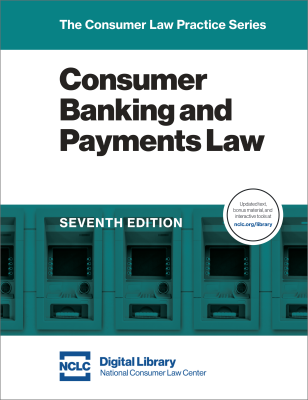Effective June 13, 2016, the Federal Trade Commission (FTC) prohibits the use of remotely created checks (telechecks) and certain other payment methods as payment for goods or services for most sales using the telephone. The ban also applies to charitable contributions solicited through telemarketing.
The prohibition is found in an amended version of the FTC’s Telemarketing Sales Rule, 16 CFR § 310. The Rule as amended is found at NCLC’s Federal Deception Law Appx. C.1.2, the amendment is set out at 80 Fed. Reg. 77520 (Dec. 14, 2015), and the Rule and these amendments are explained at Federal Deception Law Chapter 5.
While the Rule and the ban on these payment devices applies to telemarketing sales initiated by the seller or a telemarketer hired by the seller, they also apply where the consumer initiates the call in response to the seller’s advertising, direct mail solicitation, fax, or email. See 16 CFR 310.6, as amended by adding new (b)(5)(ii) and (b)(6)(ii). The Rule does not apply to online sales or sales at a physical location.
Four Banned Payment Devices in Telephone Sales
The amended rule at 16 CFR §§ 310(a)(9), (10) prohibits four different types of payment devices, whether the telemarketer initiates the discussion or the consumer responds to an advertisement, email, direct mail, or fax:
- Remotely created checks, sometimes called telechecks, where the telemarketer presents for payment from the consumer’s bank account a check created by the telemarketer or related party that includes the consumer’s bank account number and the routing number of the consumer’s bank, but instead of the consumer’s signature, the check has printed on it language such as “authorized by drawer.” See generally NCLC’s Consumer Banking and Payments Law § 3.13.1.
- Other remotely created payment orders on the consumer’s bank account, as defined at 16 CFR § 310.2(cc). One example is where , instead of seeking payment on an unsigned paper check, the telemarketer places the consumer’s account number and the consumer’s bank routing number into an electronic template that creates an electronic file for processing through the check clearing networks. While not paper, these electronic files are processed for payment like a paper check. See Consumer Banking and Payments Law § 3.13.5.
- “Cash-to-cash money transfers,” defined at 16 CFR § 310.2(f), whereby the consumer is asked to bring cash to a money transfer provider that transfers the value of the cash to the seller who can pick up the cash in person from the same or a different location of the transfer provider. See Consumer Banking and Payments Law § 6.6.2a.
- “Cash reload mechanisms” defined at 16 CFR § 310.2(g), whereby the consumer pays cash and a small fee to a retailer that loads the cash onto the consumer’s general purpose reloadable card (such as Money Paks, Vanilla Reloads, or Reloadit packs). The card comes with an access code or PIN number. If the consumer provides the access code to the telemarketer, the telemarketer can use that access code to immediately transfer value from the consumer’s card onto the telemarketer’s own prepaid card. See Consumer Banking and Payments Law § 7.2.8.
The new rule amendments do not ban other forms of payment, such as use of a signed check, a credit card, a debit card, or an electronic fund transfer. Only the four banned payment devices were found to be particularly susceptible to abuse, and lacking in the protections against unauthorized transfers that existing law provides for other methods of payment.
Private Remedies
Typically there is no direct private right of action for a violation of the FTC Telemarketing Sales Rule, because violations are remedied under the Telemarketing and Consumer Fraud and Abuse Prevention Act, and that statute provides that each person must have at least $50,000 in actual damages. See 15 U.S.C. § 6104(a).
A more practical approach is to challenge the use of a banned payment device as a state UDAP violation. This should particularly be the case for state UDAP statutes that prohibit unfair practices. The Federal Register notice accompanying the FTC’s rule amendment goes into great detail why the FTC concluded that the use of the banned payment devices are an unfair practice. See 80 Fed. Reg. 77528 – 77531. The same rationale should apply for arguing that the use of the banned payment device in an individual case is unfair.
In addition, the use of a payment device in violation of an FTC rule should be an unfair and deceptive practice under a state UDAP statute and even a per se violation of a state UDAP statute.
Other Changes in the Telemarketing Sales Rule
The FTC amended the Telemarketing Sales Rule in several other ways, and these other changes went into effect on February 12, 2016. The Rule has special protections where a scammer seeks to sell services to a consumer to recover money lost in a previous telemarketing scheme. The rule is now amended so that these protections apply where the scammer offers to recover money lost in any type of previous scheme, whether or not it involves telemarketing. See 16 CFR 310.3(a)(3)(ii)(A). See also Federal Deception Law § 5.5.3.
For certain payments without a signature, the Rule requires evidence of the consumer’s authorization. The recording showing that authorization now must include an accurate description of the goods or services for which authorization is sought. See 16 CFR 310.4(a)(3). See also Federal Deception Law § 5.4.4.2.
A number of minor changes have also been made concerning the “do-not-call registry.” Examples of illegal interference with a consumer’s attempt to be placed on the registry are listed at 16 CFR § 310.4(b)(1)(ii). Exemptions from the do-not-call list are clarified where the consumer consents to calls or has an ongoing business relationship with the caller. See 16 CFR § 310.4(b)(1)(iii). Fees to access the “do-not-call registry” are updated at 16 CFR § 310.8(c).


